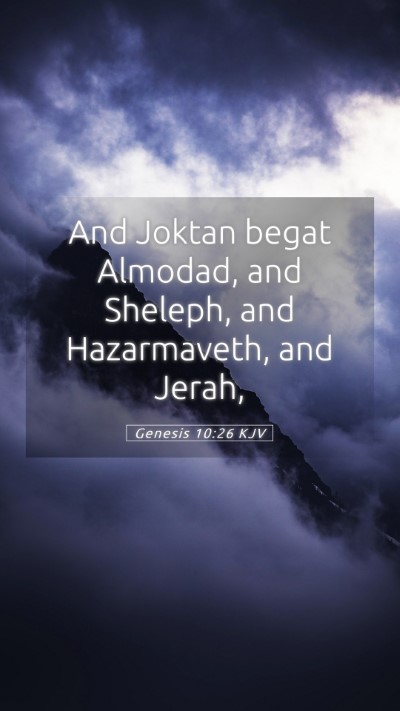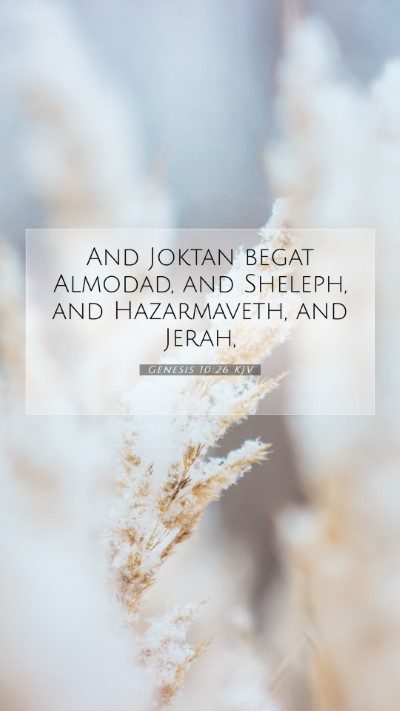Understanding Genesis 10:26
Genesis 10:26 states, "And Joktan begat Almodad, and Sheleph, and Hazarmaveth, and Jerah." This verse is part of the genealogical account of Noah's descendants, specifically focusing on the lineage of Shem, which highlights the origins of various nations in the ancient world.
Verse Meaning and Analysis
The genealogy in Genesis 10 serves several purposes in biblical literature. It not only provides a historical record but also conveys theological significance. Matthew Henry suggests that these family lines demonstrate God's providence and the fulfillment of His plan through generations.
- Theological Insights:
- Historical Lineage: The verse places Joktan and his sons in the broader context of humanity's development after the flood.
- Understanding Nations: The descendants mentioned often correspond to various peoples and regions in the ancient Near East.
- Genealogical Importance:
- Connection to Promises: Each name represents a continuing story of God’s covenant with mankind, fulfilling His promise to multiply and fill the earth.
- Roots of Civilization: Adam Clarke notes that the names may also hint at the origins of particular cultures or traits seen in these groups.
Commentary Insights
Albert Barnes emphasizes that genealogy serves as a framework to trace the nations that emerge from the descendants of Noah. These lists are foundational in understanding how different cultures and peoples emerged from a common ancestry.
This verse specifically references Joktan, considered a significant patriarch. His lineage exemplifies the scattering of nations post-Babel, an event chronicled later in Genesis 11. Understanding this helps us grasp how early civilizations developed.
Implications for Bible Study
The implications of Genesis 10:26 extend beyond mere historical records. For those engaged in Bible study groups or participating in online Bible study, this verse invites reflection on how we view heritage and the interconnectedness of humanity.
- Application of Biblical Genealogy:
- Importance in Bible Study: It encourages deeper Bible verse interpretations and “understanding Scripture” as a means to know our origins.
- Lessons from Lineage: The study of genealogies can reveal God’s sovereignty in guiding human history.
Cross References
Several other verses correlate with Genesis 10:26, providing further context and depth:
- Genesis 10:1: Introduction to Noah's descendants.
- Genesis 11:10-26: Further detail on the generations from Shem.
- Acts 17:26: The unity of mankind from one blood.
- Luke 3:36-37: Genealogy of Jesus traced back to Noah.
- 1 Chronicles 1:19: A parallel account of genealogy.
Conclusion
Genesis 10:26 offers a concise yet significant glimpse into the family tree of Noah, representing a branching point in human history. By studying this verse through commentaries like those from Matthew Henry, Albert Barnes, and Adam Clarke, we gain valuable Bible study insights that enhance our understanding of Scripture.
As we delve deeper into the significance of this verse, we uncover themes of lineage, heritage, and God's overarching plan in creation. Thus, exploring the essence of genealogical records in the Bible can enrich our personal faith journey and collective church studies.


